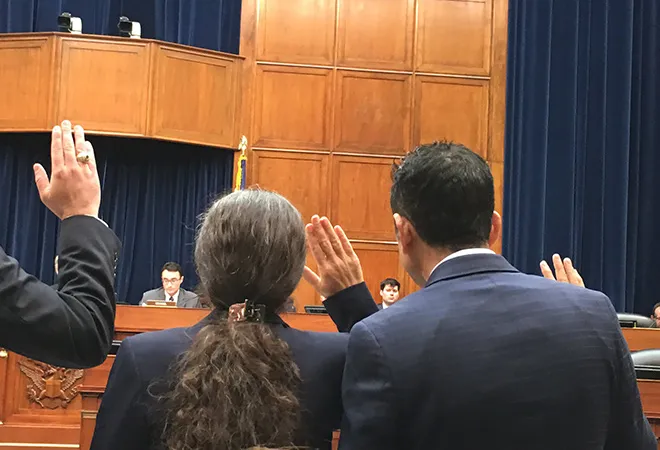
This week, the
Subcommittee on Asia, the Pacific, and NonProliferation of the US House Foreign Affairs Committee held the
second of three hearings on human rights in the region. This instalment focused on South Asia. The hearing in large-parts, however, focused on India’s preventive actions of “
barring access to foreign journalists, senators and diplomats, political detentions and the communications blockade,” following the
abrogation of Article 370 in Kashmir. Beyond questioning the communications blackout that lasted for nearly 72 days in the Kashmir Valley, but which has been withdrawn on 14 October, a partisan character of the hearing was writ large.
The Democratic Chair of the House Foreign Affairs Committee, Elliot Engel (D-NY-16)
construed India’s actions in Kashmir as it responding “in kind” to the Republican Trump administration taking “US foreign policy away from a focus on human rights, away from a focus on democratic principles, away from a focus on American values.” Whereas, the Ranking Member — highest-level Republican Congressman on the subcommittee, Ted Yoho (R-FL-3) sought to dampen criticism by making a case against the United States’ “
high standards” on human rights — in lock-step with the Trump administration’s idea of “
divorcing” US foreign policy from values.
This was symptomatic of a recent shift in American foreign policy, as it is no longer being animated by the once-insurmountable bipartisan consensus between Republicans and Democrats.
Fracturing bipartisan consensus on US foreign policy
Since the heydays of the Cold War, the US Congress’ approach to American foreign relations, as the co-equal branch to the executive, has traditionally been bipartisan. In asserting that the US must stop “
partisan politics at the water's edge,” then-Michigan Senator Arthur Vandenberg assisted the Harry Truman administration to forge bipartisan consensus on the Capitol Hill around the Truman Doctrine, the Marshall Plan, and the North Atlantic Treaty Organisation.
In times of greater political polarisation, however, the once-iron clad bipartisan consensus on US foreign policy has come under strain.
In the post-Cold War era, that bipartisan fervour continued to animate the core tenets of US foreign and security policy. This ensured the promotion of liberal
Wilsonian values, encouraging the sustenance of an ‘Open Door’ global economic system, underwriting the security of US allies around the world, and sustaining US military spending.
In times of greater political polarisation, however, the once-iron clad bipartisan consensus on US foreign policy has come under strain. With the possible sole exception of the final tenet — as the US Congress assigned a record
USD 716 billion for defence in FY-2019, a scepticism towards the United States’ “
indispensable” role in the world, has emerged on either sides of the American political spectrum.
In essence, the core of the Democratic Party has shifted further to the left. It now espouses a worldview that must function on overt moral distinction as a much needed antidote to the Trump administration’s conservative conduct of US foreign policy. Whereas, under Trump, the Republican Party has come to adhere to the interest-driven ‘America First’ worldview.
In context of this partisan divergence, India got caught in the crosshairs of the recent Congressional hearing.
The Democratic Party raided by the ‘new’ Left
On reorienting the American socio-economic fabric, the once marginal voice of independent Sen. Bernie Sanders (D-VT) has overpowered the moderate, centre left. This is clear that the Democratic primaries for the upcoming 2020 elections stand dominated by Sanders’ ideas of taking on American billionaires and breaking up big US tech companies — the very ideas which were deemed to be “
too radical” in his 2016 primary run against Hillary Clinton. Add to the mix, fresher Congresswoman Rep. Alexandria Ocasio-Cortez’s (D-NY-14) Green New Deal which seeks a major overhaul of the American energy and socio-economic systems —
estimated to cost anything between USD 52 trillion (over the next 10 years) and at the high end USD 93 trillion.
On foreign policy, this progressive ‘new left’ construes itself in direct opposition to the Trump administration’s values-bereft ‘America First’ pursuit of US interests. In then claiming absolute moral distinction against Trump’s policies, this progressive left construes overtly binary frameworks. Moreover, at times, even bigotry has crept into these simplistic “
oppressed versus the oppressor” frameworks.
In then claiming absolute moral distinction against Trump’s policies, this progressive left construes overtly binary frameworks.
This was apparent when fresher Congresswoman Rep. Ilhan Omar (D-MN-5)
criticised the Trump administration’s pro-Israel policies as being influenced by the financial clout of the pro-Israel lobby. In deriding Trump’s foreign policy, the criticism missed the Democrat Party’s own support for American policies favourable to Israel in the past. For instance, the last Democratic administration of President Barack Obama approved USD 38 billion in military assistance to Israel over the next decade — the “
largest such aid package in U.S. history”. Moreover, to many, Omar’s criticism came across “
as playing into well-worn anti-Semitic tropes.” Thus, the Democrat-controlled House of Representatives was quick to follow Omar’s comments with a resolution on “
condemning anti-Semitism and other forms of bigotry”.
Similarly, at the Subcommittee hearing, Rep. Omar underplayed realities in criticising Ms. Aarti Tikoo Singh’s (Senior Assistant Editor, The Times of India) witness
testimony. Ms. Singh’s testimony was one of the few instances during the hearing, wherein the untoward role of cross-border militants in Kashmir was discussed. Omar mocked, “
In your version of the story, the only problems in Kashmir are caused by what you call “militants”. The only people protesting to break away from India are all nefariously backed by Pakistan”.
In contrast, the witness
testimony earlier that morning by Alice G. Wells (Acting Assistant Secretary of State, Bureau of South and Central Asian Affairs) recognised the nuance of the considerable involvement of cross-border militants. Wells
noted, “Pakistan’s harbouring of terrorist groups like Lashkar-e-Taiba and Jaish-e-Muhammed, which seek to foment violence across the Line of Control, is destabilising, and Pakistani authorities remain accountable for their actions. We believe the foundation of any successful dialogue between India and Pakistan is based on Pakistan taking sustained and irreversible steps against militants and terrorists in its territory.”
The Republican Party with Trump at its core
President Donald Trump — once deemed as a political outsider, has now taken full control over America’s Grand Old Party (GOP). Since the Democrats have drummed up an impeachment inquiry, Trump has sought to underscore his control over Republican voters. There’s a clear political rationale behind Trump
tweeting his approval ratings amongst Republicans every now and then. The message is directed at Republicans — and especially those in the Republican-controlled US Senate where the impeachment process would culminate in a vote to convict Trump and remove him from office. The message is clear: “
stay in line and toe the line.”
Since the Democrats are bringing into attention Trump’s foreign policy conduct as a major component of their impeachment hearings, the Republicans’ adherence to the ‘America First’ outlook is increasingly concretising.
For those like Sen. Mitt Romney (R-UT) who have out-rightly criticised Trump’s appeal to foreign countries to investigate Democratic presidential candidate Joe Biden, the president has questioned Romney’s performance and
even called for impeaching him instead. The same has served as “
a signal to other GOP lawmakers that Trump is willing to direct his ire at them if they step out of line and offer a hint of support to Democrats’ impeachment efforts against him.”
This message seems to have been received loud and clear. Since the Democrats are bringing into attention Trump’s foreign policy conduct as a major component of their impeachment hearings, the Republicans’ adherence to the ‘America First’ outlook is increasingly concretising. In some cases, they have also been engaging in post hoc resolution of Trump’s controversial actions. A case in-point being Trump’s recent decision to cede US involvement in Syria at considerable cost to the Kurds — the United States’ operational allies in the Western coalition’s fight against the Islamic State. After initial signs of breaking with Trump, Republicans like Sen. Lindsey Graham (R-SC) have now come around to “
coordinating with Trump’s top officials to try to rein in Turkey with sanctions and protect the Kurds, and while they’re still dissatisfied with the situation, they’ve shifted gears away from confrontation with the president.”
Similarly, at the recent Congressional hearing, Ted Yoho (R-FL-3) made a case for not taking the focus away from China’s rising influence in the region, and the centrality of the continued progress of South Asia and India specifically, in the Indo-Pacific calculus. But on reining in Pakistan for its support for cross-border militancy, in a rather Trumpian fashion, he made a case against the US leading the way. He said, “…
we (the US) cannot do it alone anymore. We have to have multinational consortiums where we all say this is where we stand. And if you want to trade with us, you need to come this way. And if not, then go to China. Go to them. Let them control your people and you will regret it and your people will regret it.”
Thus, in summation, amidst the divergent partisan insistence of Republicans and Democrats on interests and values respectively, support for India became the sticking point at the recent Congressional hearing on Kashmir.
The views expressed above belong to the author(s). ORF research and analyses now available on Telegram! Click here to access our curated content — blogs, longforms and interviews.



 This week, the
This week, the  PREV
PREV


